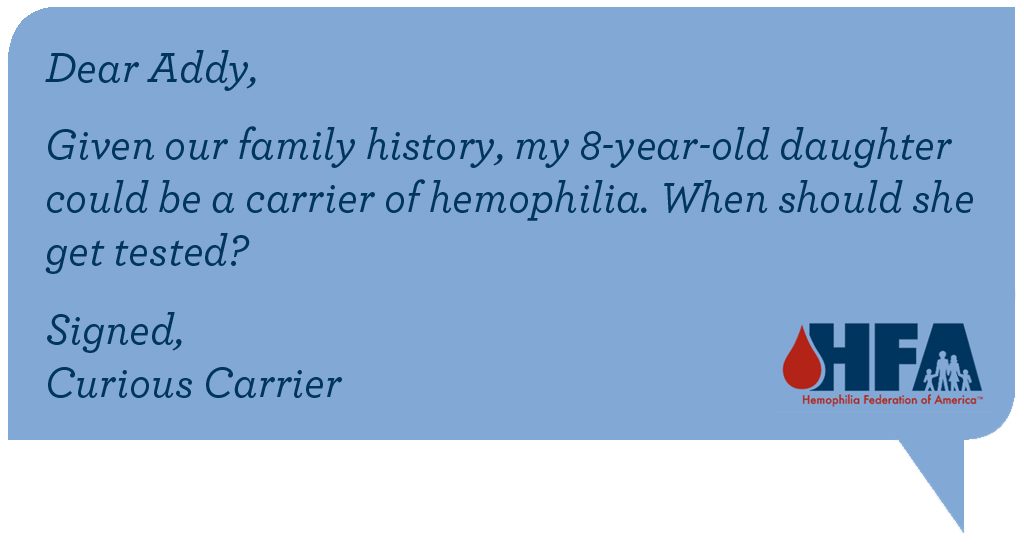
Dear Addy,
Given our family history, my 8-year-old daughter could be a carrier of hemophilia. When should she get tested?
Signed,
Curious Carrier
____________________________________________________________________________________
Dear Curious Carrier,
When to get tested is a personal decision, and you have a lot to consider. Importantly, consider that determining if your daughter is a carrier now could enhance her future quality of life. First, has your daughter exhibited any bleeding symptoms? Hemophilia carriers tend to have heavy menstrual periods, bruising, and nosebleeds, and they might bleed more during surgery or after an injury or childbirth.
Consider the following two tests if you think your daughter is a carrier:
Genetic or Carrier Testing
Carrier tests can tell you the specific gene that is causing hemophilia. This test is the only way to know for certain if your daughter is a carrier. Inform your daughter’s doctor or hematologist if genetic testing has been done for others in your family so that they can test for your family’s specific type of mutation. Genetic testing may be expensive, and your insurance might not cover it, so be sure to check before having the test done.
Factor Level Testing
Testing clotting factor levels indicates if your factor levels are low. According to both MASAC and the CDC, this test might be more important at this stage of your daughter’s life because carriers are at risk for having bleeding issues, even in pre-adolescence.[i] However, normal factor levels do not always indicate that a girl is not a carrier. Factor levels can vary with hormone changes, exercise, stress, and pain, so more than one test may be needed. Your local Hemophilia Treatment Center can help you determine your daughter’s factor level.
For more information about hemophilia carriers and medical care, visit the Centers for Disease Control and Prevention (CDC). According to “Your Guide to Mild Hemophilia,” a knowledgeable patient is a safe patient. You are your daughter’s best advocate. The sooner she is tested, the better you can manage your daughter’s health and help her become her own advocate.
Sincerely,
Addy
Have a question? Click HERE. Your name will be changed in the response.
HFA frequently receives questions from the bleeding disorders community related to advocacy issues. The questions often impact the entire community. In an effort to reach the largest audience possible with our responses to these widely applicable questions, HFA developed “Dear Addy.” Questions submitted to this column are edited in order to protect privacy and should be considered educational only, not individual guidance.
[i] Information for Women | Hemophilia | NCBDDD | CDC, https://www.cdc.gov/ncbddd/hemophilia/women.html, Page last reviewed: June 20, 2011, Page last updated: June 20, 2011, Content source: National Center on Birth Defects and Developmental Disabilities, (/ncbddd/index.html)Centers for Disease Control and Prevention (http://www.cdc.gov/)



